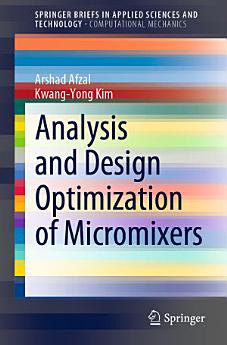Analysis and Design Optimization of Micromixers
Giới thiệu về sách điện tử này
Giới thiệu tác giả
Arshad Afzal received his B. Tech in Mechanical Engineering and M. Tech in Thermal Engineering degrees from Aligarh Muslim University, India in 2006 and 2009, respectively. He obtained his Ph.D. degree in Thermodynamics & Fluid Mechanics from Inha University, South Korea in 2015. He was awarded Postdoctoral Fellowships under the prestigious Brain - Korea 21 (BK-21) program from Inha University and Yonsei University, South Korea. Presently, he is working as INSPIRE Faculty in the Department of Mechanical Engineering at Indian Institute of Technology Kanpur, India. His research interests are mixing at microscale, surrogate modeling, optimization, neural networks, and design of fluid and thermal systems. Dr. Afzal is a member of the American Society of Mechanical Engineers (ASME) and Mathematical Optimization Society (MOS).
Kwang-Yong Kim received his B.S. degree from Seoul National University in 1978, and his M.S. and Ph.D. degrees from the Korea Advanced Institute of Science and Technology (KAIST), Korea, in 1981 and 1987, respectively. He is currently an Inha Fellow Professor in the Department of Mechanical Engineering and was a Dean of Engineering College of Inha University, Incheon, Korea. He is also an associate editor of ASME Journal of Fluids Engineering. He served as the co-editor-in-chief of the International Journal of Fluid Machinery and Systems, the editor-in-chief of the Transactions of Korean Society of Mechanical Engineers, the president of Korean Society for Fluid Machinery, and the chairman of the Asian Fluid Machinery Committee. He is a fellow of the Korean Academy of Science and Technology, a member of National Academy of Engineering of Korea, a fellow of the American Society of Mechanical Engineers (ASME), an associate fellow of the American Institute of Aeronautics and Astronautics (AIAA), and a recipient of order of science and technology merit, “Doyak Medal” from Republic of Korea.
He is interested in applications of the numerical optimization techniques using various surrogate models and computational fluid dynamics to the designs of fluid machinery, heat-transfer augmentation devices, micro heat sinks, micro mixers, coolant channels in nuclear reactors, etc. He has published 398 peer-reviewed journal papers, and presented 560 papers at international/domestic conferences.





